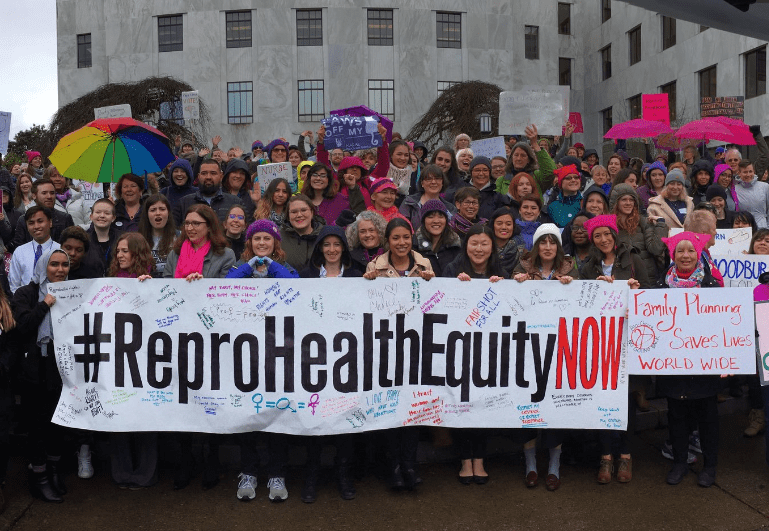Oregon Passes Nation’s ‘Most Progressive’ Reproductive Rights Bill
The Reproductive Health Equity Act requires health insurers to offer birth control and abortion without charging patients a copay. Women's reproductive rights advocates rallying at the Capitol in Salem, Ore., in February. (Planned Parenthood Advocates of Oregon / Twitter)
Women's reproductive rights advocates rallying at the Capitol in Salem, Ore., in February. (Planned Parenthood Advocates of Oregon / Twitter)
Here’s a refreshing bit of women’s rights news amid the usual anti-choice headlines: On Tuesday, Oregon Gov. Kate Brown signed a comprehensive reproductive health bill into law.
Pro-choice organizations were quick to applaud the passage of the Reproductive Health Equity Act, or Oregon HB 3391. Planned Parenthood Advocates of Oregon, calling it “the nation’s most progressive reproductive health policy,” expanded on the bill’s benefits in a press release:
Developed by the Pro-Choice Coalition of Oregon with input from legislative champions, the new law makes Oregon the first state to establish comprehensive, state-funded reproductive health coverage for women categorically excluded from Medicaid based on citizenship status; the first to codify no-cost abortion coverage in state statute; and the first to stand up to the Trump administration and congressional Republicans by putting the entire list of women’s health services covered without cost-sharing under the Affordable Care Act into state statute. The legislation also bans discrimination against those who identify as transgender or gender-nonconforming so that all people who can become pregnant have access to reproductive health care.
The press release also quotes Laurel Swerdlow, advocacy director for Planned Parenthood Advocates of Oregon: “We are so grateful for the bold leadership of Governor Brown and legislative champions who understand that Oregonians don’t want reproductive health care attacked. Women, transgender and gender-nonconforming individuals, people of color, immigrants and people of faith are not going to silently stand around while politicians in Washington D.C. try to take away our health care.”
The Oregon chapter of the American Civil Liberties Union, which is part of the Pro-Choice Coalition of Oregon, issued a statement in response to the signing:
Restrictions on reproductive health care can have profoundly harmful effects on our health and well-being, particularly for those who already face significant barriers to accessing high-quality care, such as low-income women, women of color, immigrant women, young women, survivors of domestic violence, and transgender and gender-nonconforming people.
The Reproductive Health Equity Act ensures that Oregonians, regardless of income, citizenship status, gender identity or type of insurance, have access to the full range of preventive reproductive health services, including family planning, abortion, and postpartum care. Healthier bodies lead to healthier families, and healthier families lead to healthier communities.
The legislation has its critics as well. The Washington Post reports: “Antiabortion groups swiftly condemned the new law, saying it will force taxpayers to foot the bill for a procedure many consider to be a form of murder and that it cements Oregon’s status as the most liberal state when it comes to abortion.”
While Oregon is taking steps to ensure access to birth control and abortion under the Trump administration, which has significantly rolled back access to reproductive health services, numerous Republican-led states are following the federal lead.
The Post says that in two dozen states, Republicans have tried to “restrict access to abortion in recent years by imposing strict new regulations on the procedure and on those who provide it.”
“In an indication that there is still momentum in red states to further constrain abortion access, also on Tuesday, Texas Gov. Greg Abbott signed a bill banning insurance companies from covering abortion as part of their standard health insurance plans,” the Post concludes. “Women in the state would have to pay a separate premium to have abortion coverage.”
Your support matters…Independent journalism is under threat and overshadowed by heavily funded mainstream media.
You can help level the playing field. Become a member.
Your tax-deductible contribution keeps us digging beneath the headlines to give you thought-provoking, investigative reporting and analysis that unearths what's really happening- without compromise.
Give today to support our courageous, independent journalists.








You need to be a supporter to comment.
There are currently no responses to this article.
Be the first to respond.